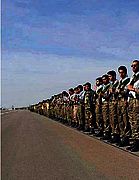Dispatch of IRGC’s Political Messengers Across the Country
» A Decade of Interference in Elections
After Basij militia commander Mohammad-Reza Naghdi announced a program to enlighten the public for “electing the best”, senior authorities in Iran’s Revolutionary Guards (IRGC) have dispatched thousands of “political messengers” across the country to influence public opinion and consequently the upcoming elections.
During a ceremony to introduce a representative of the supreme leader in the Ghamar Bani Hashemi IRGC Force (in the Chaharmahal va Bakhtiari province), ayatollah Khamenei’s representative cleric Ali Saeedi said, “Eleven thousand political messengers have been identified across the country of which seven thousand are from the Basij militia force and another five thousand from the IRGC who will be active in strengthening and elevating the moral foundations of the IRGC.”
Saeedi also said that the manifestation of righteousness in the Islamic republic was in none other than ayatollah Khamenei. “Obedience to his orders is required by all people and officials, something that is also very important for the composition of the Majlis,” he proclaimed.
These remarks in involving militia and guardsmen in politics come as Iran draws closer to its next big elections for the parliament early next year and as differences among the leaders of the country have intensified and gone public. These remarks on the role of the IRGC and the Basij are interpreted to be more direct and explicit than ever before.
On July 11 this year, Saeedi had said while people do have the right to vote, any election was not right. “Only when the choice of people matched that of God, would it be right.”
Saeedi is among those clerics who believes in the absolute rule of the supreme cleric and has not been shy to express this publicly. In his earlier remarks on this he had also said that Majlis representatives too had to be of the kind approved by the supreme leader. In fact he had said that only those representatives elected by the people who were approved by the supreme leader would be supported by him. The purpose of these representatives he added was to strengthen the supreme leader. “The hierarchy had to be such that everybody was in line with the supreme leader,” Saeedi had said.
Mohammad-Reza Naghdi’s remarks last week once again identified the role that he expects the Basij to play in the upcoming election. At a meeting of the IRGC members in the province of Golestan, he had said, “The goal of the Basij in the upcoming elections is to enlighten the public in a way that enables them to select the best, without the need of informing them of the criteria.”
The Goals of the Political Messengers
The program to create IRGC political messengers and their dispatch all over the country had been devised in the early 2000s, during the last two years of Mohammad Khatami’s administration and the sixth Majlis by the political bureau and the ground forces of the IRGC.
On May 18, 2005, less than a month before the controversial and disputed presidential elections, Sobh Sadegh weekly, the official organ of the political bureau of the IRGC wrote, “Two decades after the victory of the 1979 revolution a group inside the ruling circles has spoken of a reformist movement with emphasis on the media and students. The serial press utilizes all opponents of the regime, inside and outside the country, to present those defending and supporting the regime to be pro-dictatorship and opposing human rights.” The article wrote that following the victory of Mohammad Khatami in the presidential elections in 1997, the IRGC had to build its own instruments to protect and defend the revolution from within, and therefore a priority emerged to elevate political evaluation skills among its members, families, soldiers and Basijis.” According to the article the conditions that had emerged (i.e., the victory of reformists in elections and their representation at the highest offices of the Islamic republic) necessitated the containment of the “forces of sedition,” “confrontation with the psychological war and a response to ambiguities”, and ultimately “enlighten the public”. The program to create the political messengers was a response to these developments and realities, according to IRGC’s official journal. The political bureau of the IRGC views these messengers to be the “most organized, most powerful and most active human network for information dissemination and political guidance of the forces that support the Iranian revolution inside the IRGC.


